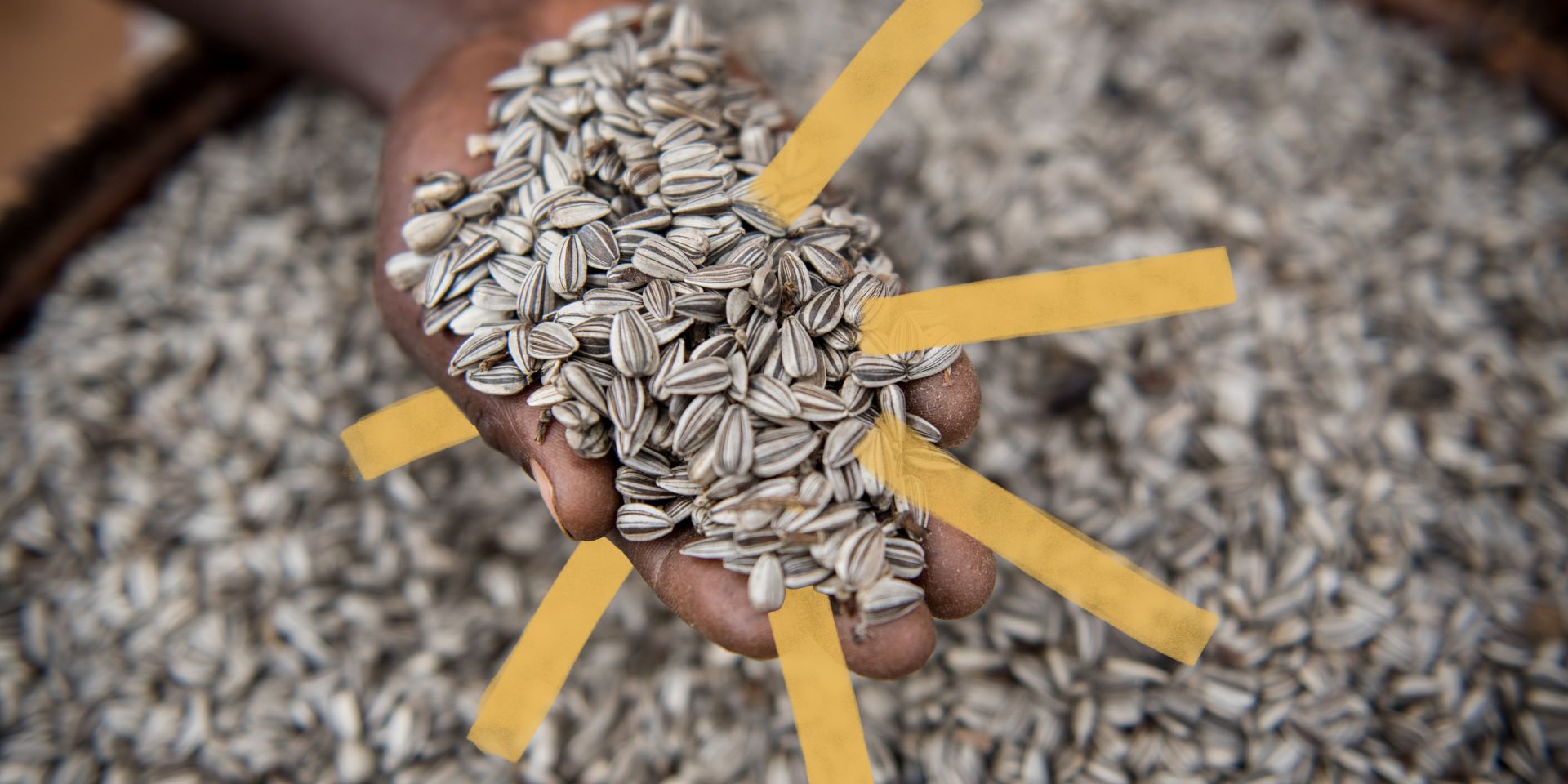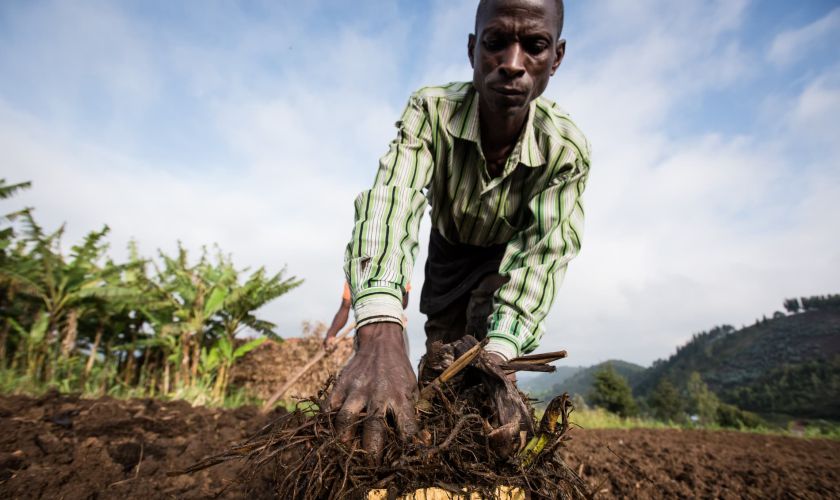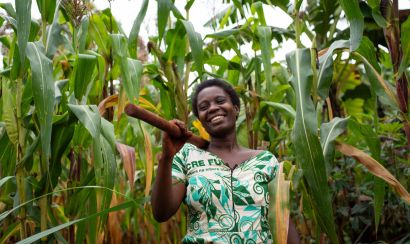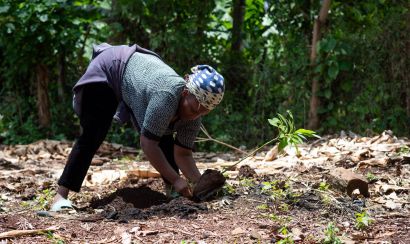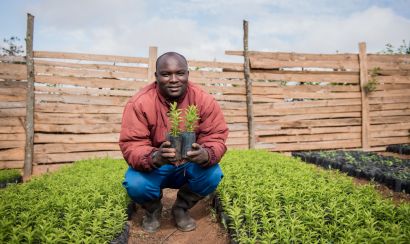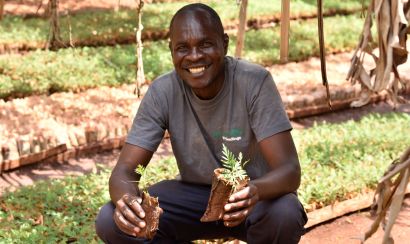Smallholders make up 70% of people living in poverty and their entire livelihood is often dependent on rainfall and an acre or two of land. Over 2 billion people rely on smallholder farms for food and income. Despite this, a recent report has revealed that of the US$653 billion of international climate finance distributed in 2021, just 0.3% reached smallholder farmers.
We need action now
At COP28 the global community has a key opportunity to change this - to redirect climate finance to smallholder farmers and support them to adapt to the rapid changes that are evident across a whole range of indicators. In our work at One Acre Fund we’ve seen first hand how financial support for smallholders can enhance adaptation and climate resilience.
One Acre Fund is calling on the COP28 community to recognise the power and agency that smallholders possess, by explicitly referencing smallholder farmers in the COP28 cover text and acknowledging both the barriers they face and the opportunities they hold.
As countries undertake a Global Stocktake - an audit of progress on climate commitments since the Paris Agreement in the lead-up to COP28 - One Acre Fund is conducting a ‘Global Croptake’. The Global Croptake summarises changes in key indicators since the Paris agreement, and what further changes the global community might see if we continue on our current trajectory.
Through the Global Croptake, One Acre Fund is asking the question: What kind of future are we collectively sowing? And how can we ensure smallholders are supported to adapt to this future?
For our Global Croptake assessment, we gathered existing data from multiple sources focused on the following areas:
- Global crop yields for maize, rice, and wheat (three of the most prolific staple food crops, which millions rely on for their livelihoods)
- Global surface temperature
- Soil health
- Extreme weather events
- Food insecurity
All of these elements together paint a picture of the challenges smallholder farmers - particularly those across sub-Saharan Africa - are reckoning with in the face of climate breakdown.
Our sources consist of research from academic institutions and international bodies such as the UNFAO, IPCC, UNDRR, World Food Programme, and World Meteorological Association.
The Global Croptake is intended to be a rallying call to action for governments, policymakers, financial institutions and civil society to increase engagement with and investment in smallholder farmers, ensuring smallholders can build a prosperous future and sustain their livelihoods despite the income shocks, loss and damage caused by the climate crisis.
What did we find?
Our Global Croptake paints an alarming picture. Whilst crop yields have increased since the Paris Agreement, that doesn’t mean food security has reduced in tandem. Since 2015, the world has seen severe food insecurity increase by over three percentage points. Looking into the future, it’s a grim forecast if we don’t collectively take action now. If we remain on our current trajectory, we will see declining crop yields, further soil degradation, and a staggering rise in hunger and malnutrition.
Read on for our full Croptake to understand why support for smallholder farmers will be essential in the face of climate impacts.
Crop yields
Smallholder farmers rely on staple crops to sustain their livelihoods. Yields of maize, wheat and rice - three of the most prolific staple food crops, and some of the most relied-upon for livelihoods by small-scale producers - have continued to increase since 2015 according to crop yield data from UNFAO. However, according to a paper published in 2021 by Wing, De Cian and Mistry, under a vigorous warming scenario there could be a global decline in crop yields of 3–12% by 2050 and 11–25% by 2100.
Global surface temperature
Global surface temperatures have continued to rise since 2015. Higher temperatures directly impact crops, making certain areas too hot and too dry to grow certain staples. For example, a recent study from NASA found that rising temperatures would contribute towards a decline in maize in the tropics.
Looking to the future, according to the IPCC, if we don’t change the trajectory we’re on as a global society, temperature could increase by as much as 4.4°C above pre-industrial levels by the end of the century.
Soil health
Our review of available soil data showed that global soil moisture content has declined steadily in the 21st century, and 33% of soils are already degraded. Meanwhile, nitrogen leaching has increased since 2015.
Looking into the future, up to 90% of soils could become degraded by 2050.
Soil health is an integral factor in the livelihoods of smallholder farmers. Healthy soils store and supply nutrients to support and sustain plant growth, are essential to water purification and carbon sequestration and are home to a large variety of organisms, microorganisms, bacteria, fungi, and pollinating insects. Maintaining and improving soil health is therefore essential to ensuring farmers can stay resilient in the face of increasing pressures on land and a changing climate. Meanwhile, smallholders are key custodians when it comes to preserving global soil health.
Extreme weather events
Rising temperatures over the last several decades have been accompanied by an increase in frequency and intensity of climate-related disasters. Smallholder farmers are particularly vulnerable to cyclones, droughts, floods, and other extreme climate-induced events - despite having almost no role in generating the emissions that have led to them.
Our review of existing data found that between 2000 and 2019 the number of climate-related disasters (such as floods, droughts, and storms) increased by 83% compared to the previous two decades (1980-1999).
It’s not just the frequency of disaster events that is increased by global heating either - intensity is also affected. The IPCC predicts that the proportion of category 4 and 5 tropical cyclones could increase by 10% at 1.5 degrees Celsuis of heating, and 20% at 4 degrees Celsius of heating.
The implications of these events for smallholder farmers could be devastating, particularly in Sub-Saharan Africa: loss and damage from extreme events is a lived reality that already threatens livelihoods across the region.
Food insecurity and nutrition
Sub-Saharan Africa is set to experience growing poverty, with 9 out of 10 people living on $1 a day projected to be in rural areas by 2030. About half of farmers where One Acre Fund operates face moderate-to-severe hunger, and 15% experience severe hunger.
Since the Paris Agreement in 2015, food insecurity has risen from just under 8% of the total population to just over 11% of the total population, according to UNFAO data. Meanwhile the prevalence of undernourishment has increased from just under 8% to just over 9% of the total population.
The future projection is discouraging, with the World Food Programme warning that the risk of hunger and malnutrition could rise by 20% by 2050.
It’s clear that we must take meaningful collective action on food systems at a global scale if the world is to prevent smallholder farmers from experiencing food insecurity.
So, what next?
The Croptake’s revelations are sobering: tipping points are being approached at multiple junctures, and it is smallholder farmers who will find themselves at the sharp end of the subsequent impacts.
However, in the midst of this crisis lie many solutions. Smallholders are custodians of the land, and therefore hold a crucial role in addressing the impacts of climate breakdown. They have the opportunity to employ tools, training and techniques that will move them towards more sustainable and prosperous livelihoods, and contribute to individual and collective resilience in the face of climate breakdown.
That’s why increasing engagement with and investment in smallholders will be a key component in transforming global food systems to be more sustainable, equitable and resilient. A thriving network of climate smart and resilient farmers across Sub-Saharan Africa is a win-win for people and the planet.
One Acre Fund is working towards ensuring farmers can build a prosperous future and sustain their livelihoods despite the income shocks, loss, and damage caused by the climate crisis.
Our work spans three pillars:
One Acre Fund is focused on helping farmers adapt to the rapidly changing climate. We train smallholders to adopt climate-smart practices to increase farm yields sustainably. Additionally, we support income diversification and design safety nets to ensure financial stability.
One Acre Fund is also supporting smallholder farmers to mitigate the impacts of the climate crisis through mass on-farm tree planting and soil health practices that sequester carbon from the atmosphere.
One Acre Fund advocates that supporting smallholder farmers is pivotal for achieving global climate goals. We work collaboratively with farmers to develop solutions for smallholder resilience - through focus groups, mass annual household surveys, 'always on' customer hotlines in every country, and through our field staff themselves, who are majority farmers from the communities where we work.
Through this work we see first-hand how adopting climate-smart agriculture techniques, planting trees and revitalising soil health are part of a number of long-term, holistic interventions that farmers can pursue to build climate resilience. And how increasing finance for impactful programs supporting smallholder farmers will improve global food security and environmental stewardship.
Smallholders are just getting started in their work to overcome the challenges of the climate crisis, embed resilience, and ensure a prosperous future. That’s why One Acre Fund is calling on the COP28 community to recognise the power and agency that smallholders possess, by explicitly referencing smallholder farmers in the COP28 cover text and acknowledging both the barriers they face and the opportunities they hold.
Thriving farmers create a thriving world. Together, let’s #FarmToThrive.
Learn more about our climate resilience work
One Acre Fund is focused on helping farmers adapt to the rapidly changing climate. Adaption is critical - hundreds of millions of people in Sub-Saharan Africa depend on agriculture to support their families.
Climate mitigation
One Acre Fund supports smallholder farmers to mitigate the impacts of the climate crisis through on-farm tree planting and soil health practices that sequester carbon from the atmosphere.
Climate leadership
One Acre Fund is advocating for smallholder farmers to be put front and center of global climate decisions. This is pivotal for achieving global climate goals.
